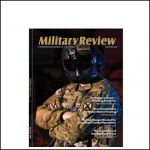
e-Document
|
Military Review, March-April 2009.
Copies
0 Total copies, 0 Copies are in,
0 Copies are out.
Unifying physical and psychological impact during operations. Brigadier General Huba Wass de Czege, U.S. Army, Retired; America's love affair with technology and raw power eroded appreciation for the psychological dimension of war.
Narrowing the gap: DOD and stability operations. Colonel David W. Shin, U.S. Army; Performing all stability lines of operations as a "core mission" is impossible for the U.S. military; it does not have the resources. DOD must prioritize its strengths--providing civil security and control.
Tal Afar and Ar Ramadi: grass roots reconstruction. Captain Chad M. Pillai, U.S. Army; Because no clear linkage exists between Army units' short-term goals and broader interagency goals, tactics meant to foster local governance and economic development have produced mixed long-term results.
Not my job: contracting and professionalism in the U.S. Army. Lieutenant Colonel William C. Latham Jr., U.S. Army, Retired; Imagined efficiencies of contracting may cause the U.S. military to lose its jurisdiction over traditional roles.From peddlers to sheiks: a contracting case study in southern Baghdad. Lisa A. Verdon; Coalition contracting for public projects in Iraq suggests that reconciliation in Iraq comes at the discretion of the sheik.
All our eggs in a broken basket: how the human terrain system is undermining sustainable military cultural competence. Major Ben Connable, U.S. Marine Corps; The military should expand its organic, sustainable cultural expertise rather than waste resources on external academics and the appendage called the "Human Terrain System."
Complex operations in Africa: operational culture training in the French military. Colonel Henri Bore, French Army, Retired; An expert from the French Army relates how cultural expertise was a critical combat skill that led to success for French counterinsurgents of the recent past.
Testing Galula in Ameriyah: the people are the key. Lieutenant Colonel Dale Kuehl, U.S. Army; David Galula claims that popular support for the counterinsurgent requires an active minority working on its behalf. Ameriyah showed him to be correct.
A view from inside the surge. Lieutenant Colonel James R. Crider, U.S. Army. The "surge" worked, and David Galula's 40-year old treatise proved its worth in the process. His works should be required reading for American military professionals.
Amnesty, reintegration, and reconciliation: South Africa. Major Timothy M. Bairstow, U.S. Marine Corps; South Africa successfully employed the principles of amnesty, reintegration, and reconciliation (AR2).
Educating by design: preparing leaders for a complex world. Colonel Stefan J. Banach, U.S. Army; The School for Advanced Military Studies is meeting a recognized need for new conceptual tools to assist commanders in the operational planning process.
The art of design: a design methodology. Colonel Stefan J. Banach, U.S. Army, and Alex Ryan, Ph.D.; Two experts provide a brief overview of adaptive learning to develop comprehensive plans for complex missions.
2nd place: 2008 Depuy writing contest.
Learning from moderate governments' approaches to islamist extremism. Major Eric A. Claessen Jr., Belgium Armed Forces; One can learn much from states that controlled extremists for decades.
Insights. The future combat system program. Major Luis Alvarado, U.S. Army; The Future Combat System will be the Army's best connection to America's future war machine.
Book reviews: contemporary readings for the professional.
Letters.
Inside back cover.
2009 General William E. DePuy Combined Arms Center Writing Competition; "Leader Development from Initial Entry Training to the Battlefield".
Title
Military Review, March-April 2009.
Call No
CDMC Military Review
Digital Link
Subjects
Language
English
Published
Fort Leavenworth, KS : Combined Arms Center,, 2009.
Series
Target Audience
Unknown or not specified









